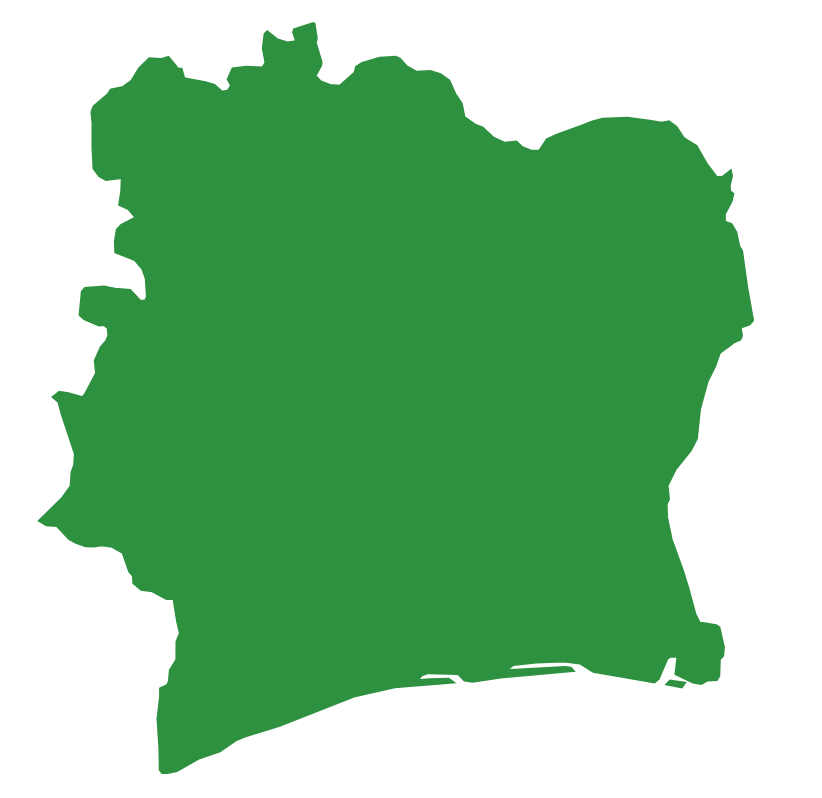Côte d’Ivoire

Nationally determined contribution
Targets
Côte d’Ivoire forecasts an increase of GHG emissions to reach around 156 million tonnes in 2035. Côte d’Ivoire’s contribution presents an unconditional ambition of 33.07% corresponding to an abatement of fifty-one (52) million tonnes equivalent CO2 in 2035 compared to the scenario of reference (1990). This would result in a reduction of emissions from 156 to 104 million tonnes equivalent CO2. Additional conditional measures in the implementation of the NDCs could bring the overall ambition of GHG mitigation to a reduction of 74.29% of total emissions in 2035 compared to the scenario of reference (1990). This would result in a reduction of emissions from 156 to 40 million tonnes equivalent CO2.
Article 6 engagement
Côte d’Ivoire plans to finance part of its NDC implementation through carbon markets, leveraging both the Article 6 mechanisms of the Paris Agreement and voluntary markets.
The country has established the Bureau Marché Carbone (BMC) in 2024 and an institutional framework to regulate carbon markets, supported by specific provisions in their national Climate Law (loi cadre sur les changements climatiques).
Mitigation activities
NDC 3.0 identifies 26 key mitigation measures (down from 38 in NDC 2.0), reflecting a more targeted approach with quantified sectoral objectives for 2035:
Energy
- Expand access to clean cooking (70% LPG use, 25% improved biomass stoves)
- Transition to 100% LED lighting
- Improve appliance efficiency
- Promote energy efficiency in public and commercial buildings
Oil & Gas
- Cut methane emissions by 50% by 2035
Industry/PIUP
- Reduce HFC consumption by 70% (vs 2020 levels)
- Replace refrigerants with low-GWP alternatives
- Support cleaner production processes
Transportation
- Achieve 12% electric vehicle imports by 2035
- Reach 25% biodiesel blending (from rubber) in bus fleets by 2030
- Introduce 5% sustainable aviation fuel by 2035
- Renew vehicle fleet (60% Euro VI imports)
- Increase low-carbon public transport to 10% of trips
Agriculture
- Reduce CH4 and N2O through sustainable rice cultivation, livestock management, and optimized fertilizer use
Waste
- Expand micro-anaerobic digestion and composting
Forestry and Land Use (LULUCF/UTCATF)
- Restore 1.5 million ha of forest (including 250,000 ha production forests and 1.1 million ha agroforestry)
- Convert 2.5 million ha of farmland to sustainable agroforestry systems
Sectors covered by the NDC
The NDC covers all sectors of the economy, including energy, industry (PIUP), agriculture, waste and forestry & land use (LULUCF), now expanded to include agroforestry, buildings, and resilient cities as new adaptation and mitigation areas.
Finance needs
The total estimated cost of implementing NDC 3.0 is USD 58.8 billion (± 33 trillion FCFA), including:
- USD 27.2 billion for mitigation
- USD 34.8 billion for adaptation
CIV expects financing from domestic sources such as state budget allocations, national climate fund, private sector investment, PPPs. Internationally, financing sources include climate funds (GCF, GEF, AF), concessional loans, bilateral support, and carbon market revenues under Article 6 or voluntary markets.
Carbon pricing
Status
Not available
Carbon markets
National entities responsible for carbon markets
Ministry in charge of carbon markets
Ministère de l’Environnement, du Développement Durable et de la Transition Ecologique
Article 6.4 DNA
Ms. Rachel Boti-Douayoua
rbdouayoua@gmail.com
CDM DNA
Ms. Rachel Boti-Douayoua
rbdouayoua@gmail.com
Article 6 strategy and regulations
National registry
Pipeline
Article 6
Bilateral agreements
- Not available
Mitigation activities
- Not available
CDM
Data
As of December 31st, 2021, Energy (Non-renewable) projects are the only CDM activity in Cote d’Ivoire with issued credits, accounting for a total of 484.42 kt.
2018 was the year with the largest volume of issued credits for energy (non-renewable) projects, with 484.42 kt issued.
Voluntary Carbon Market
Download VCM activity portfolioData
As of September 6th, 2024, Cote d’Ivoire has 5 projects registered with the VCM, out of which 4 are registered with the GS and 1 is registered with the VCS.
As of September 6th, 2024, RE projects are the leading VCM activity in issued credits for Cote d’Ivoire, with a total of 4967.39 kt.
Household projects are the second most prominent VCM activity, with issued credits accounting for 63 kt.
As of September 6th, 2024, RE projects are the leading VCM activity in retired credits for Cote d’Ivoire, with a total of 280.97 kt.
Household projects are the second most prominent VCM activity, with retired credits accounting for 2 kt.

